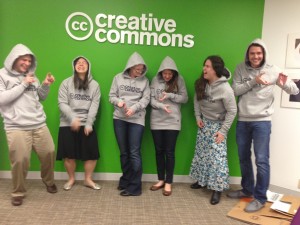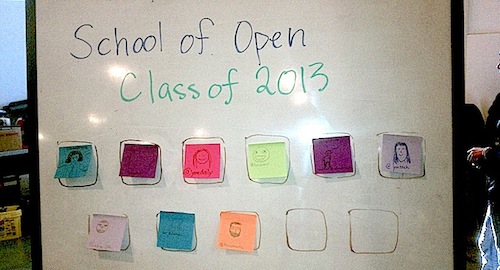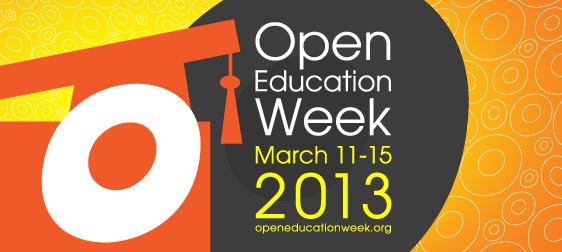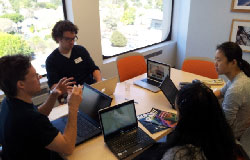
Sophie Kershaw at CC HQ
Hanging around with our own kind, we in the open science community might get lulled into thinking that everyone out there thinks like us. In reality, most scientists actually do science instead of worrying about whether or not it is open. However, even though some of their practices align with open science objectives, there is much more that can be done proactively to engender an open commons of science.
Sophie Kershaw, doctoral student in computational biology at University of Oxford, came up with the idea of injecting Open Science Training in formal curriculum, and teaching young scientists about Open while they are still young and learning about the scientific method, as part of her Open Knowledge Foundation supported Panton Fellowship. In Sophie’s words:
As the Open Science movement gathers pace, we are seeing developments in policy and infrastructure to support the transition of academia towards Open practices. Despite this, there is a considerable lag in awareness within the academic community itself – many researchers either haven’t heard about Open, or know the term but don’t know how to put it into practice! From a show of hands on the first day of my Open Science Training Initiative (OSTI), only ONE grad student out of 43 had heard of open science. It is now time for us all to step up our efforts in educating our academics in licensing, open access and data management, preferably through provision of pre-doctoral training. Our first research group plays a huge role in shaping our research outlook, but this leaves us with a huge variability in the level of awareness that students develop. Some will pitch up in a very forward-thinking group, where licensing, collaboration and data archiving is the order of the day, while others are left without this kind of information. Pre-doctoral training will ensure continuity of provision for ALL our science grads, enabling them to make their own decisions with confidence.
This kind of practical intervention delivered right to young scientists sounds like a great idea, and as Sophie says, reactions to the first edition of OSTI seem to confirm that:
Students from the inaugural OSTI came out strongly in favour of receiving training in licensing and engaging in debate on development of the publication process: furthermore, they’ve shown that while lectures are handy, hands-on experience is the best way to learn about how to license, how to release data, how to communicate science. We need to emphasize delivery of a coherent research story – comprising appropriately licensed data, code and writing – rather than merely the traditional written report. We need to make our young researchers see themselves as research users as much as research producers. Over time, this should help our newest grads deliver verifiable, reproducible research with vast potential for further development and scientific impact.
The Open Science Training Initiative is not an idea with immediate returns. Instead, it is for bringing about long-term change so the next generation of scientists and beyond proactively default to open. There are challenges ahead, such as creating right formats for different conditions and audiences, finding right partners who would incorporate OSTI in their courses, and scaling to reach the next generation of scientists all over the world. But, it is an idea we consider worth supporting, because the potential returns are lasting in nature.









